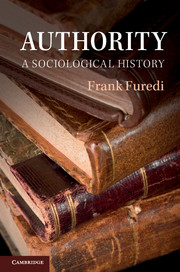Book contents
- Frontmatter
- Contents
- Preface
- Introduction: always in question
- 1 Thersites and the personification of anti-authority
- 2 Socrates and the quest for authority
- 3 Rome and the founding of authority
- 4 Augustus: a role model for authority through the ages
- 5 Medieval authority and the Investiture Contest
- 6 Medieval claim-making and the sociology of tradition
- 7 Reformation and the emergence of the problem of order
- 8 Hobbes and the problem of order
- 9 The rationalisation of authority
- 10 The limits of the authority of the rational
- 11 Taming public opinion and the quest for authority
- 12 Nineteenth-century authority on the defensive
- 13 Authority transformed into sociology's cause
- 14 The rise of negative theories of authority
- 15 By passing authority through the rationalisation of persuasion
- 16 In the shadow of authoritarianism
- Conclusion: final thoughts
- Bibliography
- Index
6 - Medieval claim-making and the sociology of tradition
Published online by Cambridge University Press: 05 June 2014
- Frontmatter
- Contents
- Preface
- Introduction: always in question
- 1 Thersites and the personification of anti-authority
- 2 Socrates and the quest for authority
- 3 Rome and the founding of authority
- 4 Augustus: a role model for authority through the ages
- 5 Medieval authority and the Investiture Contest
- 6 Medieval claim-making and the sociology of tradition
- 7 Reformation and the emergence of the problem of order
- 8 Hobbes and the problem of order
- 9 The rationalisation of authority
- 10 The limits of the authority of the rational
- 11 Taming public opinion and the quest for authority
- 12 Nineteenth-century authority on the defensive
- 13 Authority transformed into sociology's cause
- 14 The rise of negative theories of authority
- 15 By passing authority through the rationalisation of persuasion
- 16 In the shadow of authoritarianism
- Conclusion: final thoughts
- Bibliography
- Index
Summary
Medieval political life during the twelfth and thirteenth centuries was dominated by the problem of the constitution of authority. According to one account, the twelfth century felt this concern with a ‘new intensity, rarely matched during the centuries intervening since the death of Augustine in 430’. Old dynasties searched for a new foundation for their authority, papal officials sought to expand the role of Rome in Europe's temporal affairs and advocates of city autonomy were busy constructing arguments for their independence. Within medieval urban centres, noted Weber, ‘numerous claims to authority stand side by side, overlapping and often conflicting with each other’. The authority of Roman law competed with that of feudal Germanic custom and Christian doctrine, and medieval lawyers had to integrate these ‘three systems of thought’ and reconcile their potentially contradictory claims to authority. As one study of medieval law observes:
Perhaps their most difficult task was to accommodate a conception of kingship that rested on divine foundations, derived in part from Roman and in part from Christian thought, with Germanic and feudal kingship, which based its claim to legitimacy on the relationship of the king to his barons and people.
In the prosperous commercial centres of Italy, rapid social and economic change created a condition of fluidity and instability that tested the influence of traditional authority. In such ‘relatively unstable circumstances with competing authority claims’, the traditional ruler's authority was often displaced or ‘usurped’ by popular associations led by a new class of prosperous merchants. This urban revolution was frequently legitimised by the construction of legal precedents and procedures. The Italian jurist Bartolus de Saxoferrato (1314–1357) developed the idea of popular consent from customary law, representing custom as an expression of people's consent and an important constituent of legitimation. Bartolus's main innovation was his attribution ‘to the independent city-populus within its territory the jurisdictional powers which the emperor possessed within the empire as a whole’. Although he recognised parallel jurisdictions derived from imperial and papal sources, his development of the role of consent helped to consolidate the idea of city-state sovereignty.
- Type
- Chapter
- Information
- AuthorityA Sociological History, pp. 124 - 148Publisher: Cambridge University PressPrint publication year: 2013



